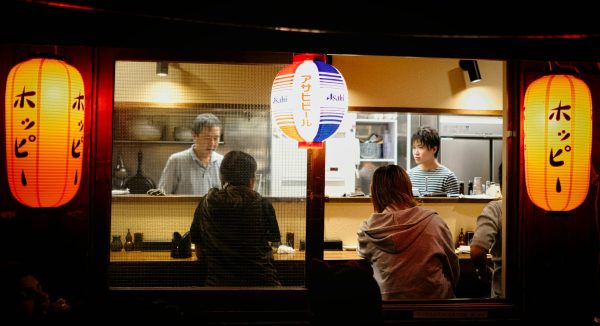My mom and I were in a Zen Garden at the temple of Tofuku-ji, the air thick and humid, infused with the scents of wet stone and green earth. We sat on a smooth wooden floor that framed the meticulously raked rock garden, sheltered from the pouring rain of a summer typhoon. As we gazed out at the thousands of droplets cascading onto the pebbles and glistening bonsai trees, the serenity was suddenly broken by a loud, deep groan.
“It’s not fair [that the Korean school] won in our own country [Japan]. How is that meant to make us look?” complained an old man at the temple. In Japanese sports culture, remarks like this are not out of the ordinary. Rather, these complaints reflect a broader sentiment that surface following a significant event in Japanese sports — Kōshien, the final outcome of the Japanese national high school baseball championship tournament. This year, the score was 2-1. The winner? Kyoto International High School, a school which happens to be for ethnic Korean students living in Japan.
Despite the proximity and cultural overlap of Japanese and Korean culture, spite was a common reaction held by many Japanese citizens after this final game, and this reaction brought to light Japan’s nationalistic ideals and discrimination towards non-Japanese people.
To understand the reaction to the Korean school’s victory, it’s crucial to recognize the significance of Kōshien in Japanese culture.
Every hot and humid early August in Japan, Kōshien commences, a series holding a significance in Japan that parallels the Super Bowl in the United States. It’s a national event that is broadcasted in every small shop, restaurant, and home. Even those who don’t care for sports gather in ramen shops, drawn by the energy of the crowd. Groups huddle together, eyes glued to the screen for hours. Phrases such as, “Ehh, OOH! Ahh…” ripple through the air as people react in unison, often comedically so.
“Kōshien is everywhere in the media landscape in summer,” said Kyoto local Yuka Kanno, a professor in the Graduate School of Global Studies at Doshisha University in Kyoto, “and nobody can really avoid that!”
“[T]he older men and grandpas around me in their 60s to 80s are super passionate! They critique like they’re the coaches [he laughs]. They spend all their summer time watching it, I think,” jokes another local.

Kōshien is more than just a sporting event; it’s a cultural phenomenon that ignites a sense of national pride and community spirit. Kōshien invites one high school team from each of the 47 Japanese prefectures, making high schools into symbols of hope and ambition for local communities. Young athletes can embody the dreams of their peers and hometowns. However, this sense of unity can be quickly overshadowed by underlying tensions regarding ethnic identity.
For the tens of millions of viewers across the country, the victory of a school with ethnically Korean roots was anomalous. The outcome heightened tensions between Japan and Korea and fueled discrimination towards ethnic Koreans in Japan.
Many viewers reacted with disbelief and resentment. The backlash against the Kyoto International High School winning was fueled by Japan’s brand of nationalism, which places heavy emphasis on ethnic identity.
Japan has a long history as an isolated and homogenous society — Japanese people make up 98% of the population, and Koreans form just under 1%. In this context, the victory was surprising. Many Japanese expressed frustration, particularly over the Korean-language anthem that was played at the stadium upon the team’s victory, which led to hate speech on social media and anonymous threats against the school.
The historical tensions between Japan and Korea can be traced back over 15 centuries, punctuated by significant events such as Japan’s annexation of Korea from 1910 to 1945. During this period, cultural suppression was rampant. Policies aimed at erasing Korean identity were implemented, including the banning of the Korean language and forced assimilation. The scars of this history have left a lasting impact on the Korean community in Japan, leading many to hide their roots to avoid discrimination.
With the rising popularity of Korean culture — such as K-pop, K-dramas, and Korean cuisine — many have observed a decrease in anti-Korean sentiment. Additionally, the Japanese government has made efforts to reduce overtly discriminatory practices. However, when it comes to personal relationships and community pride, the impact of discrimination can still be profound. Reiko, an ethnic Korean in Japan, shared her experience: “Even a generation later, my eldest son faced disapproval from his girlfriend’s parents, who told him that dating a Korean was not acceptable. It’s unfortunate that despite changing times, not much has improved compared to the past.” Her experiences echo a sentiment that many ethnic Koreans in Japan continue to face today.
The evocative nature of local pride becomes particularly evident in the context of Kōshien. While many Japanese may not express outright racism towards Koreans in casual settings, the victory of a Korean high school team often provokes strong nationalist sentiments. For some, this win challenges deeply ingrained notions of national identity and belonging, stirring feelings of defensiveness.
A spokesperson from the J-Korean museum in Minato, Japan — a museum on the history of ethnic Koreans in Japan — explained, “[t]his event illustrated Japan’s limited understanding of multicultural coexistence. The atmosphere became charged with outright animosity, revealing social rifts that are historically rooted.”
For decades after the war, many Koreans living in Japan continued to struggle in navigating their identities in a society that often marginalized them. The struggle is poignantly illustrated by Mr. Lee Ho-Woong, the former principal of the Korean High School that won the baseball championship. As a second-generation Zainichi Korean, he described his experiences growing up feeling caught between two cultures.
“Until I was about 14, I lived while hiding my identity as a Korean. I was liberated from Japanese colonial rule, but shortly after, the Korean War broke out, leading to an unstable social situation. I received negative news about my homeland through adults and developed a strong aversion to my Korean roots,” Mr. Lee Ho-Woong reflected.
The recent victory by the Korean baseball team became a moment of pride, as players openly sang their school song in Korean. Mr. Lee Ho-Woong, founder of the winning Korean team’s baseball team stated, “I was glued to the internet cheering for our team during all the games… I felt deeply moved hearing our school song in Korean while achieving national dominance. We were able to promote our school across Japan, and I sincerely hope it continues to grow and develop as an institution that bridges Korea and Japan.” Yet the preceding backlash showed this wasn’t exactly how the reaction to the game panned out. The visibility of Korean ethnic identity was met with contention by some Japanese, who saw it as a challenge to their own sense of national identity.
Expert opinions also shed light on the implications of the Korean team’s victory for Japanese nationalism. Professor Yuka Kanno said she saw “no significant change in Japanese nationalist ideology with Kyoto International High School’s winning. This event unfortunately didn’t have a major impact on the exclusionary tendencies and politics of the Japanese and the local governments, including Tokyo.”
Yukkiko, a Japanese person living in America, reflected “as a Japanese person, I might feel a bit conflicted about it. Especially the part where the school song is in Hangul.” The victory song being sung in Hangul, was a major point of contention. The song went:
“동해바다 건너서 야마도 땅은 (Across the East Sea, the land of Yamato is)
거룩한 우리 조상 옛적 꿈자리” (The dream site of our holy ancestors’ past)
The first line references the “East Sea,” a term used in South Korea, rather than the “Sea of Japan,” directly engaging with a longstanding territorial dispute that remains a sensitive issue between the two nations. By invoking “Yamato,” an ancient name for Japan, the line ties Japanese identity to a historical narrative that some may feel is challenged by the acknowledgment of the East Sea.
The use of Hangul, the Korean script, in a song associated with a Japanese school further provoked nationalist sentiments, as it was often perceived as a statement about cultural integration or dominance. The phrase also touches on historical grievances stemming from Japan’s colonial past in Korea, making it a flashpoint for emotions tied to national pride and historical memory.
The social media response to the victory was particularly revealing. Many users expressed outrage, posting tweets with Korean slurs and insults, while others attempted to dismiss the Korean school’s accomplishments as undeserved. The polarization highlighted the ongoing struggle for acceptance faced by Koreans in Japan.
The politicization of sports often complicates what should be a straightforward appreciation of athletic achievement, and underscores the tension between national pride and the realities of a multicultural society.
The events surrounding Kōshien reveal deep societal fractures. Kōshien, with its rich history and cultural significance, serves as a microcosm of Japan’s struggle with its identity. The juxtaposition of celebration and backlash in the wake of the Korean school’s victory reveals the complexities of navigating a multicultural landscape in a nation that has historically prioritized homogeneity.
The game and its backlash challenges all of us to reconsider what it means to be part of a national identity in an increasingly interconnected world. Ultimately, it calls for a more inclusive understanding of success — one that recognizes the diverse tapestry of identities that contribute to the rich cultural fabric of Japan.
The events surrounding Kōshien reveal deep societal fractures. Kōshien, with its rich history and cultural significance, serves as a microcosm of Japan’s struggle with its identity. The juxtaposition of celebration and backlash in the wake of the Korean school’s victory reveals the complexities of navigating a multicultural landscape in a nation that has historically prioritized homogeneity.

